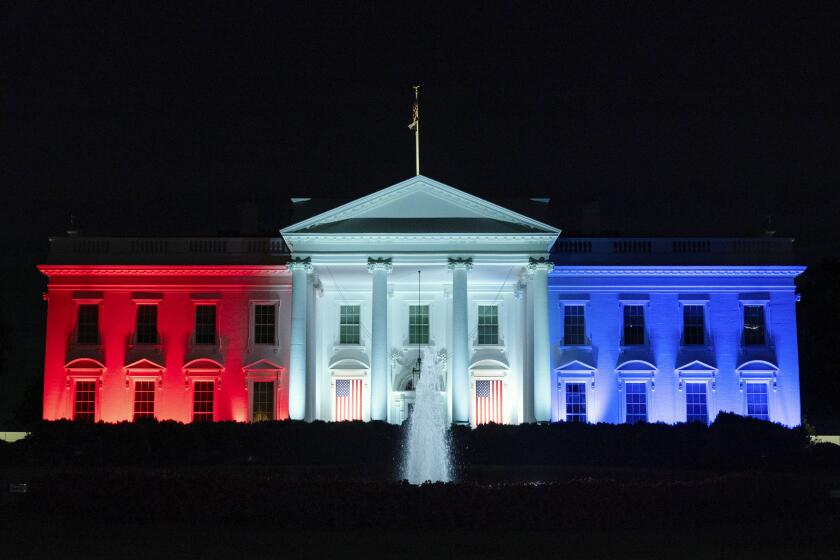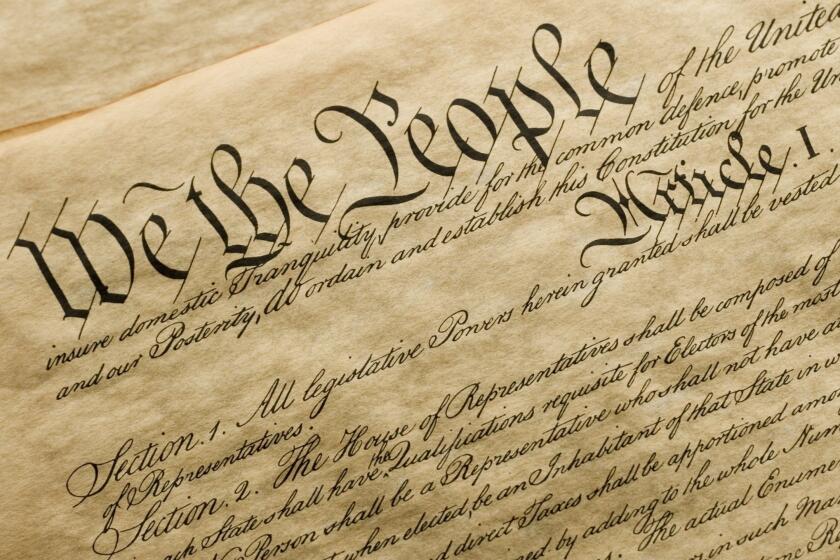The U.S. alone is saddled with an electoral college. How did that happen?

- Share via
In 2016 and 2020 Donald Trump lost the popular election by several million votes. But in 2016 he won in the electoral college with slim majorities in several toss-up states. That is the only way he can win the looming election, a contest all the polls show is too close to call. Once again, it is entirely possible that we will elect a president whom a majority of American voters reject.
The rest of the world finds this arrangement incomprehensible. Although the process varies in the details elsewhere, heads of government tend to be chosen by direct vote or by the party that wins the most votes in a parliamentary election.
So the question becomes, how did the American founders, justifiably famous for their political wisdom, burden us with the strange contraption called the electoral college?
Goldberg: Here’s why the race between Donald Trump and Kamala Harris looks so impossibly close
This election reflects the fact that Republicans and Democrats have both become minority parties relying on base voters instead of a decisive electoral majority.
The answer lies in the historical record of the debates at the Constitutional Convention during the summer months of 1787. As we travel back in time, there are a few features on the historical landscape unique to post-revolutionary America that will strike us as strange.
One is the ghost of Britain’s King George III. The debate over executive power, as recorded in contemporaneous journals, letters and articles, is difficult to follow, like watching a soccer match played with three balls and no referees. The one conviction the delegates could all agree on was that the president must not be a monarch who stood above the law. (The recent Supreme Court decision, Trump vs. United States, flagrantly defied that core conviction.)
Column: The presidential race won’t be over on election night. Here’s what can go wrong after that
Trump will claim the election was rigged, and if he loses will challenge the results. Last time, the guardrails of democracy held. How about this time?
The second strange-to-us feature, even more disturbing to our current political presumptions, is a deep suspicion of democracy. Throughout the American founding the word “democracy” was an epithet, and remained so until the Jacksonian era. The watchword during the founding era was “republic,” from the Latin “res publica” meaning “public things.” The public interest, for Madison, Jefferson, Washington and the others, was the long-term interest of the people, something the founders thought the bulk of voting Americans (white male landowners) would seldom comprehend because of their limited horizons and susceptibility to conspiracy theories, misinformation and demagogues. (Sound familiar?)
When the question of how to elect a president arrived on the agenda in August 1787, suggestions included election by the Senate, by state Legislatures and finally by popular vote in all the states. Multiple critics objected to the latter option on the grounds that popular opinion was notoriously unreliable.
Trump should stop sowing doubt about voting and put aside any thought of responding to a loss in a close election with spurious claims of fraud.
These raw and misguided opinions needed to be filtered through more informed and educated minds. James Madison stepped forward to coin the term “filtration” and then “Electoral College” to describe state legislators capable of comprehending the long-term public interest, and, if necessary, over-ruling the popular vote in the states. Alexander Hamilton endorsed this “filtration” approach in Federalist 68.
Filtering the presidential choice through electors was not designed to enhance the political power of the Southern, pro-slavery states, but that in fact is what it did. During the debate over how to count population for representation in the House, the delegates passed the three-fifths clause, basing representation on “the number of whites and three-fifths of the blacks.” The political advantage the three-fifths clause gave to Southern states in presidential elections was the main reason that Thomas Jefferson was referred to as “the Negro president” after his narrow victory in the election of 1800.
After 2000 and 2016, you can’t blame Democrats for hating the electoral college. But it would be a huge irony if they managed to ditch the system just as it began to once again tilt blue.
The ironies of the electoral college abound. The founders did not foresee the emergence of political parties and their winner-take-all slates of electors, which make a mockery of all presumptions of virtuous choosing by a select few. What’s left is indeed a filtration of the popular vote, but one that has morphed into a device whereby the minority defeats the majority.
As a result, the very outcome the founders most feared, namely election of a demagogue by a gullible cult of true-believers, has been made possible because of the electoral college, which was originally designed to avoid precisely that outcome.
James Madison was right. The electoral college is a shoddy piece of work that keeps coming back to haunt us.
Over the past century no feature of the Constitution has generated more criticism and cries for reform than the electoral college. All have failed, largely because it would require a constitutional amendment, which the founders made politically difficult to pass, requiring a two-thirds vote in both branches of Congress and a three-fourths vote in the states. Too many legislators, not to mention state voters, would opt to retain their power rather than endorse U.S. democracy.
So we are stuck with our electoral albatross. Perhaps the danger posed by a Trump presidency will generate the energy needed for long overdue constitutional reform. If I have them right, a majority of the founders are up there cheering us on to that very end. The first item on their list of fixes would surely be killing the albatross.
Joseph J. Ellis is a Pulitzer Prize-winning historian. His latest book, scheduled to be published in 2025, is “Realities and Regrets: The Tragic Side of the American Founding.”
More to Read
A cure for the common opinion
Get thought-provoking perspectives with our weekly newsletter.
You may occasionally receive promotional content from the Los Angeles Times.














